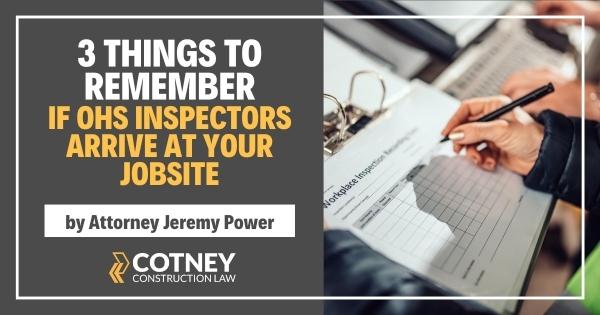UP TO THE MINUTE
3 Things to Remember if OHSA Inspectors Arrive at Your Job Site

By Jeremy Power, Cotney Construction Law.
Learn what employers should be aware of regarding OHSA obligations in Ontario.
Employers have a lot of responsibility when it comes to workplace safety. Paramount among these responsibilities is to take every reasonable precaution for the safety of workers – no easy task at the best of times and complicated even further in the age of COVID-19.
To help our clients navigate this difficult time, below is a list of things employers should always be aware of pertaining to an employer’s OHSA obligations in Ontario, while taking into account changes as a result of the COVID-19 crisis.
1. The employer’s obligations to its workers under the Occupational Health and Safety Act
As stated above, an employer is obligated to take all reasonable precautions to protect both the health and safety of all workers on site. Furthermore, an employer is obligated to instruct, inform and supervise workers to protect their health and safety, and to inform workers about any hazard in the workplace, including communicable diseases like COVID-19. Finally, an employer is obligated to cooperate with any joint health and safety committee that has been established at the work site.
2. Circumstances in which an employer is obligated to investigate and report injuries and incidents in the workplace
According to the OHSA, injuries and incidents must be reported to a Workplace Health and Safety Officer if they:
-
Result in death;
-
Cause a worker to be admitted to hospital;
-
Involve an unplanned or uncontrolled explosion, fire or flood that causes or have the potential to cause a serious injury;
-
Involve the collapse or upset of a crane, derrick or hoist; or
-
Involve the collapse or failure of any component of a building or structure necessary for the structural integrity of the building or structure.
If an injury or accident occurs at a work site, or if any other serious injury or accident that has the potential of causing serious injury to a person occurs at a work site, the employer must:
-
Carry out an investigation into the circumstances surrounding the serious injury or accident;
-
Prepare a report outlining the circumstances of the serious injury or accident, and the corrective action, if any, undertaken to prevent a recurrence of the serious injury or accident; and
-
Ensure that a copy of the report is readily available for inspection by an Officer.
3. Preparing for the arrival of an Occupational Health and Safety Inspector
The OHSA provides Officers with significant powers to enter a workplace or project without prior authorization to ensure compliance with laws and regulations governing workplace safety. The following is a list of practical steps for employers to take prior to and during an Officer’s visit:
Before an Officer arrives:
-
Designate one contact person at each location.
-
Develop procedures for dealing with inspectors and train staff in these procedures.
-
Maintain a separate file for material over which you wish to claim solicitor-client privilege.
-
Keep in-house or external legal counsel updated on any situations that may increase the likelihood of an inspection.
When an Officer arrives:
-
Immediately contact the designated contact person.
-
Check the Officer’s identification.
-
Ask the Officer to explain the purpose of their visit. For example, is it a surprise inspection or a more specific investigation? Are they investigating in aid of a possible prosecution?
-
Consider immediately contacting legal counsel.
-
Have someone (preferably the designated contact person) accompany the Officer at all times.
-
Be careful not to obstruct the investigation. However, the employer may be able to make alternative arrangements for the time and date of the inspection.
-
Keep notes of everything the Officer does and says in their visit.
-
Remember that anything you say may be recorded by the Officer and used against the employer.
-
Keep a record of all documents and other items taken by the Officer.
-
Cooperate in any interviews but consider asking the inspector to return later to conduct the interviews. This will give legal counsel an opportunity to meet with any persons to be interviewed before the interview.
-
Request that legal counsel or another employer representative be present in any interviews.
-
Ensure that everyone answers all interview questions fully and honestly.
-
If the Officer has a search warrant, immediately contact legal counsel and ask the Officer to wait until your legal counsel has arrived. Although the Officer has no obligation to wait, most will.
-
If you have any objections to anything the Officer is doing, note your objections on paper but do not attempt to obstruct the search.
Although employers should always have a defence of due diligence ready in case an inspector turns up an OHSA violation, it is imperative during COVID-19 to have an extra level of preparedness.
Learn more about Cotney Construction Law in their RoofersCoffeeShop® Directory
Written by Jeremy Power, a lawyer in Cotney Construction Law’s Toronto office. To contact Jeremy, please email jpower@cotneycl.com
Disclaimer: The information contained in this article is for general educational information only. This information does not constitute legal advice, is not intended to constitute legal advice, nor should it be relied upon as legal advice for your specific factual pattern or situation.





















Comments
Leave a Reply
Have an account? Login to leave a comment!
Sign In